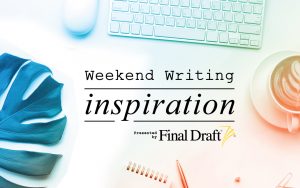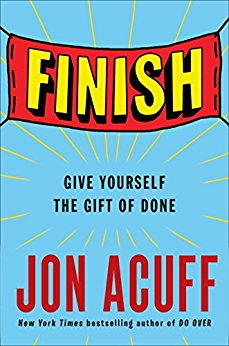
by Jenna | Aug 4, 2020 | Final Draft Articles
Last week I wrote a piece for the Final Draft blog about 7 creative strategies to survive distance learning AND keep writing this fall.
Like many parents, school is majorly on my mind right now, so I’ve been thinking about how best to work with the situation as best I can. One thing I didn’t include in the article (and maybe should have) was how my husband and I are already dividing up the week into a split schedule so we each have solid chunks of protected work time. We’ll adapt that more as we move into the school season.

“The goal is simply to move forward. The goal is to progress, however slowly, in a productive direction. It is the realization that this is, now more than ever, a game of inches and not of miles.”
— Chuck Wendig

With many school districts here in the U.S. planning to open this fall with “full distance” or “hybrid” learning in short order, many writer-parents are anxiously wondering how to keep working their day jobs — let alone keep writing and preserve our well-being — on top of being full-time educators. (And even if you’re not in the U.S., let’s face it: writing and parenting always requires creative planning to pull off, so hopefully this is useful to you, too.)
As someone who has been working from home since 2002 (I’ve kept my business running through my two boys’ early childhoods; they’re now 6 and 12), I’ve come into this situation knowing firsthand how frustrating it can be to try to eke out time and space for work and writing in the midst of taking care of children. And managing distance learning only complicates the care.
Having said that, I also know it’s possible to continue to write, even when pressed for time, energy, and mental bandwidth.
Let me share with you a few things I’ve learned over the years.
Read the article on the Final Draft blog here —> 7 Creative Strategies to Survive “Distance Learning” and Keep Writing This Fall

Image credit: Photo by Ketut Subiyanto from Pexels

by Jenna | Jul 16, 2020 | Final Draft Articles
This week I wrote a piece for the Final Draft blog about mindset perspectives to help us all stay motivated to write, even with everything that’s going on in the world (and at home!). I’ve been using these thoughts and ideas like anchors to help myself write, so I wanted to share them with you too.

“The purpose of a writer is to keep civilization from destroying itself.”
— Albert Camus

Between the pandemic, sweeping societal upheavals, and general world news, it is a massive understatement to say there’s a lot going on right now. It’s easy to get derailed or give up hope. A few weeks ago, I wrote about ways to stay productive and take care of your mental health at the same time.
Building on that theme, today I’m sharing seven mindset perspectives to help you stay motivated to write. Use these thoughts to counter any conflicting thoughts, feelings or self-doubt about your work so you can keep doing what you were put here to do.
Read the article on the Final Draft blog here:
7 Mindset Perspectives to Motivate Your Writing

Photo by Mika Baumeister on Unsplash

by Jenna | Apr 10, 2018 | Book Reviews
 I’ve just finished reading Finish: Give Yourself the Gift of Done* by Jon Acuff. It’s a delightfully irreverent book packed with useful insights — sometimes counterintuitive — about how and why we stop ourselves from finishing (hint: perfectionism is the root cause).
I’ve just finished reading Finish: Give Yourself the Gift of Done* by Jon Acuff. It’s a delightfully irreverent book packed with useful insights — sometimes counterintuitive — about how and why we stop ourselves from finishing (hint: perfectionism is the root cause).
It’s been a particularly fun read right now for three reasons.
First, I’ve been reading it alongside several of my community members and we’ve been discussing it on our online site. I have a feeling we’ll be doing this again. It’s a mini online book club. Yay!
Second, I’m just about to lead the goal setting call for a writing intensive I’m running so I’m looking forward to incorporating some of Acuff’s principles into our goal setting work. And since the intensive is designed to help people finish (or make major progress in that direction), it’s particularly apropos.
Third, I know I’m a recovering perfectionist. Or at least a perfectionist who’s trying to recover. (The first step is admitting you have a problem!) So this book was useful on both professional and personal fronts.
Here are some of my favorite takeaways from the book:
- The “day after perfect” is the make-or-break day. Acuff says the “day after perfect” often turns up as soon as day two of pursuing a goal. I see this happening with writers who put in a big burst of enthusiastic writing for their first day out (sometimes later), then crash and burn the next day by going into massive writing aversion and avoidance the next day… which can lead to despair and giving up. I much prefer to see writers pacing themselves for the long haul. Acuff makes the point that we have to focus on “moving forward imperfectly” and “trying again… today, tomorrow, or next week.” I’ve always been a fan of “starting over tomorrow,” whenever I get off track with my goals so I’m right there with him.
- There’s a difference between commitments and distractions. Acuff makes a useful distinction between the things we’re committed to doing, like our day jobs and our kids, as our commitments, and things like Netflix — and those side projects you turn to when it’s time to write — as distractions. See how simple that is? I found this useful for reinforcing what I do when I write out my Three Big Rocks list, which is to focus on the key things I want to accomplish for my goals that day. I don’t include my standing commitments (taking care of my kids and exercising, for example), because I think of them as “givens,” but prioritize the three major commitments I’m making for the day.
- You can look for your own sweet spot with rewards or penalties (or both) when it comes to goal setting. Acuff says, “make it fun if you want it done,” and recommends establishing a reward or a penalty for your goal. I’m more motivated by rewards than punishment, but his writing had me think more about deciding on really fun rewards, and deciding on them in advance. I’m particularly thinking about how I can do this on the daily and weekly scale (one example he gave was how author Sammy Rhoades would reward himself with a Friday afternoon movie for meeting his writing goals, which sounds right up my alley).
- Pay attention to where you “hide” from your goals. Acuff describes both “hiding places” — where we go to avoid our goals — and “noble obstacles” — the clever schemes we design to make it so we can’t possibly focus on our goals because we’re serving some higher purpose. I’ve seen so many writers over the years come up with the most fascinating and suddenly highly important non-writing or OTHER writing projects than they originally come into our programs with. This is really worth paying attention to and short-circuiting.
- Put your new idea at the finish line for your current one. If you tend to come up with a new idea that’s much more appealing than your current project the minute you start (in the coaching world, we call these Bright Shiny Objects), Acuff recommends making the new idea the project you “get to” work on when you finish your current one. With writing, I recommend what I call a “Project Queue” (tips on how to do this with writing projects are in my free guide, “How to Choose Your (Next) Book“). The core idea is to promise to work on the new idea next. In a sense it even becomes a reward for getting to the end of the current one. Yay!
- Aim a little lower with your goal setting. Acuff recommends cutting our goals in half, either by cutting the quantity or output in two, or by doubling the amount of time we give ourselves. This is because most of us are entirely unrealistic about how we set our goals. I’ve personally been setting fewer and fewer goals over the last few years, after seeing myself being unable to attain the multiple, too-fast-paced goals I was aiming for, and I can see right now from checking my 2018 goals list that I may have a bit more tweaking to do after reading Finish, especially after the hard start to the year I’ve had.
- The “day before done” is another place many of us go astray. I’ve witnessed this in my own writing, suddenly becoming apathetic toward a screenplay, telling myself I’ve just lost interest in the story. Acuff identifies three primary fears triggered by a looming finish, including a fear of what happens next (Amazon reviews!), a fear it won’t be perfect, and a fear of “what now?” The key, he says, is addressing these fears with a combination of trusting yourself to figure it out and being open to seeing what happens.
More my favorites in this book are the “secret rules” we use to sabotage ourselves (“If I lose all this weight, then I’ll have to go dancing/be looked at/feel more vulnerable”), choosing what to “bomb” (where you’re strategically choosing to suck at something in order to prioritize your goal), using data to track your goals and “celebrate your imperfect progress,” and many more.
While there were times I wasn’t 100% sure if I thought Acuff was actually writing about resistance and not so much about perfectionism (which I consider to be a subcategory of resistance), I loved what he shared and he has stirred some useful thinking and insight for all of us who have read it.
Highly recommended.
* This is an Amazon affiliate link, which means Called to Write will earn a small commission if you purchase the book after clicking on this link, for which we are greatly appreciative!

by Jenna | Mar 23, 2018 | Writing Articles
There are many stages of writing.
There are the practical stages — inspiration, idea, concept, development, outlining, drafting, revising, editing, polishing, and proofing.
There are the emotional stages of a writing project — from eureka! to discouragement to resolve to despair to euphoria to apathy to completion. It’s an up and down journey sure to delight the most ardent theme park enthusiasts. Or not.
There are also a set of career stages in a writer’s life. We might experience them as a progression as we evolve from feeling the call to write to treating it the way a professional does, or we might move in and out of these states along the path to writerdom.
For example:
- Wanting to write but not writing.
- Writing occasionally, ephemerally, but not quite getting anywhere.
- Binge writing in a big burst of enthusiasm, to meet a deadline, or in a NaNoWriMo-fueled burst, but then crashing into writing aversion/burnout for a long period of time, maybe even months or years.
- Writing regularly and consistently, but maybe not as productively as you’d like to be, possibly struggling with creative blocks along the way.
- Writing like a pro.
Before you hit the pro stage (and sometimes even then), these stages can be sometimes more fulfilling than others, depending on where you are in your writing career.
For example, if you’ve been wanting to write forever, and you’re finally writing every day, even for just a few minutes day, that’s a huge win. On the other hand, if you’ve been plodding away at a draft, day in and day out, and feeling like you’re never getting anywhere, it might be time for a push with your writing.
I generally work with writers in my writing community who want to go from not writing to writing. From writing sporadically and inconsistently, to writing daily. (Or as one of our writers put it, writers who want to go from whining to writing. LOVE that.)
In the online writing intensives I run, I work with writers who are ready for more. They might have the daily writing thing down, but want to put in a focused burst of work on their books or screenplays. This usually happens when they have a goal they’re trying to reach and want a boost of progress to get there.
Here are some examples of times you might be ready for a big push with your book or script.
Signs You Might Be Ready to Go for a Push with Your Writing
- You’re willing and able to carve out the time and space in your life for an ultra-focused period of writing. This means being willing to clear your schedule of any and all extraneous commitments and otherwise scaling back where you can (stockpile your freezer now!) to make it easy on yourself.
- You have a story idea you want to develop or outline and want to (need to!) carve out some time to do it. Putting in a few weeks of intense attention can get you to the finally “ready to write pages” stage and feel incredibly satisfying.
- You’re writing, but you’re stuck in a rut or feeling complacent about your work and your progress. There’s nothing like doing a big push on your book or script to get you out of your comfort zone and operating at a higher level of productivity. You’ll want to make sure you have a way to keep writing once you get to the other side of a focused burst of writing so you don’t crash and burn afterward.
- You’ve done all the prep work for a new project but you’re hesitating and holding back from diving into the actual writing. If you’re sitting on the edge of the pool, scared to even dip in a toe, now might be exactly the right time to take the plunge. It can be easier to face all the resistance in one go, especially if you find a way to write alongside other writers to help support you.
- You’re in the middle of writing a book or a big rewrite and you’re struggling to see the light at the end of the tunnel. The dreaded middle of any stage of book is called the dreaded middle for many reasons, including that it’s just plain hard to get through. Remember — when you’re going through hell, keep going. This is a good time to put on a burst of speed, keep your head down, and keep working.
- You’re staring down a deadline and procrastinating or struggling to pace yourself and you want to avoid the binge-burnout cycle you’re setting yourself up for. Many writers (especially those dealing with second novel syndrome, I find) get stuck in procrastination when there’s a deadline coming up — not close enough to spur you into action, but not far away enough to totally ignore. This makes for a constant and uncomfortable low level of guilt and anxiety. Whether you’re working on a self-imposed deadline, a publisher’s deadline, or other submission deadline, using a focused, structured burst of writing to help pace yourself can be life and sanity saving, plus you’ll be far better positioned not to lose your writing habit on the other side.
- You’re making progress, kind of, but you’d really like to put some mileage on this thing and see your page count climb. Along the same lines as the “dreaded middle,” sometimes you just need to see something, anything happening to feel some sense of progress and accomplishment (so helpful with these long form writing projects).
- You need a safe space to write. If when you’re part of a critique group (or even just hard on yourself in your internal mental conversations), you may want a separate, critique-free writing “space” where you’re just committed to the process regardless of anything else happening. It can be both healing and relieving to “just write” and is particularly so when you’re writing with a group of like-minded writers who help you normalize the experience of writing.
- You wish you could go on a retreat or disappear to a cabin in the woods but you can’t quite swing it with your budget (or your family, job, or other commitments). Finding a way to create a writing retreat for yourself from the comfort of your own home is a lovely alternative and can fulfill much of that desire in you to “get away and write.”
- You know what you want to write but you’re having trouble overcoming resistance. That monster called resistance can be handled in a couple of ways. One is by sneaking past it in small increments of writing time, which is an excellent way to get started. The other is to jump in, full bore, and write like your life depends on it. The trick is having a structured support to help you keep going afterward.
If You’re Ready to Go Big, Here’s How
If you’ve decided you’re ready to make a big focused burst of progress with your writing, while there are certainly options, like creating a self-led writing intensive for yourself or attending a writing retreat (if you can swing the travel, lodging, and retreat costs), I’m a fan of online writing intensives to help you focus and get the most bang of your buck.
There are certainly times when a writing intensive is NOT the way to go — if you’re dealing with creative wounds for example, or having trouble figuring out what to work on. If you’re wondering if you’re ready for a big burst of writing progress, shoot me an email or ask me a question in the comments and I’ll be happy to talk it over with you.
Featured image photo by rawpixel.com on Unsplash

by Jenna | Mar 20, 2018 | Writing Articles
Let’s talk about writing. And overwhelm.
First, a story.
When I was a kid, my parents used to take us on high Sierra backpacking trips. They were hard. We’re talking about high-altitude, have to hit 10,000 feet before you get to the lake kind of hard. With backpacks. On super steep trails. In the blazing sun. I was also prone to altitude sickness, so there wasn’t a lot of incentive to go higher, other than the incredible beauty of the alpine lakes and the satisfaction we had once we reached our destination.
Which was actually a hell of an incentive.
Every summer my sister and I would slog up the steep trails, managing the weight of our packs on our sore shoulders, the blisters forming on our feet, the headaches creeping in, the tiredness, and the whininess that would sneak into our voices. My dad always brought up the rear, even though he was the fastest and strongest hiker.
In every trip, there were always points along the way where I begged to stop. I’d despair that we’d ever get there. My dad was my coach at those times. Giving up wasn’t an option. He was always patient, calm, and quiet. He’d just wait with me until I was ready to get up and keep going.
He’d say, “Just keep putting one foot in front of the other. Don’t think about how far it is to the top. Just look at the trail right in front of you, and focus on getting to the next bend in the trail. Then the next, and the next.”
And bit by bit, we’d get there.
Overwhelm In Writing
As writers, we often hear the line from E.L. Doctorow, “Writing is like driving at night in the fog. You can only see as far as your headlights, but you can make the whole trip that way.”
Usually this quote is used to describe the process of figuring out a story and how we find our way through it, bit by bit. But we can also use it to describe and understand the entire process of writing, from first draft, to rewrite(s), to publication, and to marketing, including dealing with any and all overwhelm at each of those stages.
When we’re writing, the big gap between here (where you are right now) and there (where want to end up — done! finished! published!) can feel pretty darned overwhelming. So overwhelming, in fact, that you might be wondering if you’re even capable of making it.
Underlying Causes & Solutions for Addressing Overwhelm
Let’s dig a little deeper into where you might be feeling overwhelmed, and then look at some solutions to help you find your way through.
6 Underlying Causes of Writing Overwhelm
When you’re feeling overwhelmed, no matter what stage of writing you’re in, here’s what might really be going on:
- There’s so much left to do, and it really is overwhelming. Writing a book is a long haul project. So is a screenplay, when you consider the many drafts a script often goes through before it’s produceable and marketable. There’s a ton of work left to do, and it’s easy to feel disheartened when staring up the face of the enormous mountain you’re attempting to scale. (Hint: You’re looking at the mountain, not the trail.)
- You’re scared to put yourself out there. Writing a book can trigger self-doubts, fears, procrastination, perfectionism, and resistance. When you’re conscious of it, you can feel overwhelmed by the enormity and responsibility of it all. When you’re less conscious of it, you can get stuck in writing overwhelm as a kind of “safe haven.” It can feel easier to go around in circles than to take the risk of fulfilling your big dream.
- You’re doubting that you’re up to the challenge. Hand-in-hand with #1, above, you might not even feel sure you have what it takes to write at the level required to succeed. You might be losing confidence in yourself, your book, and your ability to write. If you’re in this place you may be so overwhelmed that you’re considering giving up on your book, or worse, giving up on writing altogether. This is the kind of overwhelm that comes from a crisis of confidence.
- You’ve lost your way. Sometimes you can end up feeling lost, like you’re not sure how to solve the story problems you’re facing (or even to figure out what the problems truly are), or you’re overwhelmed with a sheer quantity of content and disorganization, and you can end up going around in circles, feeling paralyzed, dazed, and confused. The fear here is that you’ll never find your way.
- It feels like you’re running out of time. Many of us have this ticking clock inside our heads about when it’s okay and when it’s too late to “arrive” on the scene with our finished books. The fear here is that it’s too late for you, which creates a sense of overwhelm around trying to fit way too much into too little time.
- You’re feeling overwhelmed by life, too. We’re busy. All of us. Our culture, our world, and our lifestyles seem to be busier than ever and only getting worse. Finding time to write seems darned near impossible when you’re juggling a job, kids, friends, pets, family, spouses, and more. The fear here is that you don’t have the time and space in your life to actually pull off making time to write, which again leaves you feeling overwhelmed.
6 Solutions for Moving Past Overwhelm and Into Action
Here are six solutions to help you overcome the overwhelm and move into action with your writing.
- Keep putting one foot in front of the other, just like my dad taught me. The most basic antidote for overwhelm is to take the smallest possible steps, one by one, to move through it. This means making a plan for how you’ll approach your writing (or rewriting), and working on it in the smallest possible pieces until it’s done. In fact, the more resistance, fear, or doubt, you’re feeling, the smaller the chunk you’ll want to work on (even if you spend all day working on small pieces). If you keep your focus on the next step right in front of you, you can get through to the end.
- Get mad. Resistance is a smothering force. It paralyzes you and bogs you down, until you begin to feel hopeless and like you’ll never succeed. Anger, on the other hand, holds the powerful energy of action. When resistance gets you down, get mad. Use the energy of being a little (or a lot!) pissed off that resistance is trying to beat you to get fired up and get back to work. When I feel discouraged, my fighting spirit rises up in me and says, “No way! I’m not letting resistance win.”
- Use a map, aka, remember your Big Why. When you’re lost and overwhelmed, remind yourself of your Big Why. Think about (and write down, for next time) WHY you’re writing this book. What do you love about it? What are your deepest reasons for wanting to write this book? Reconnect with your passion and love and energy for the book. Pair that with the energy of anger to light a fire inside yourself.
- Get help for the climb. Sometimes, you need help to reach the top of the summit. This could look like working with a coach, joining a writing group, or partnering up with a buddy. Someone who will be patient, supportive, kind, and compassionate without giving up on you for a single second.
- Make a push of progress on your book. A nifty trick for dealing with overwhelm is making a focused, concerted burst of progress on your story. Writing solidly, with focus, helps you regain your sense of identity and your confidence in yourself as a writer. This is what Tony Robbins calls “massive action.” And though I generally advocate for regular daily writing as the primary antidote for resistance, sometimes we need to take powerful action to restore our confidence, energy, and momentum. You can do a focused writing intensive to help you make that happen.
- Remember your ultimate destination. Not only are you writing this book or screenplay right now, you’re also working to fulfill your overall writing career goals. This project, right now, is part of the map you’re using to get there. While this might sound like contradictory advice, holding the big view of what you’re doing and why you’re doing it can help with taking the small steps along the trail.
The reward?
Reaching that ultimate destination. Seeing the world you want to see, from the great heights you’ve earned, step by step.


1. Featured image by AJ Yorio on Unsplash
2. Unsplash

![]()
![]()






